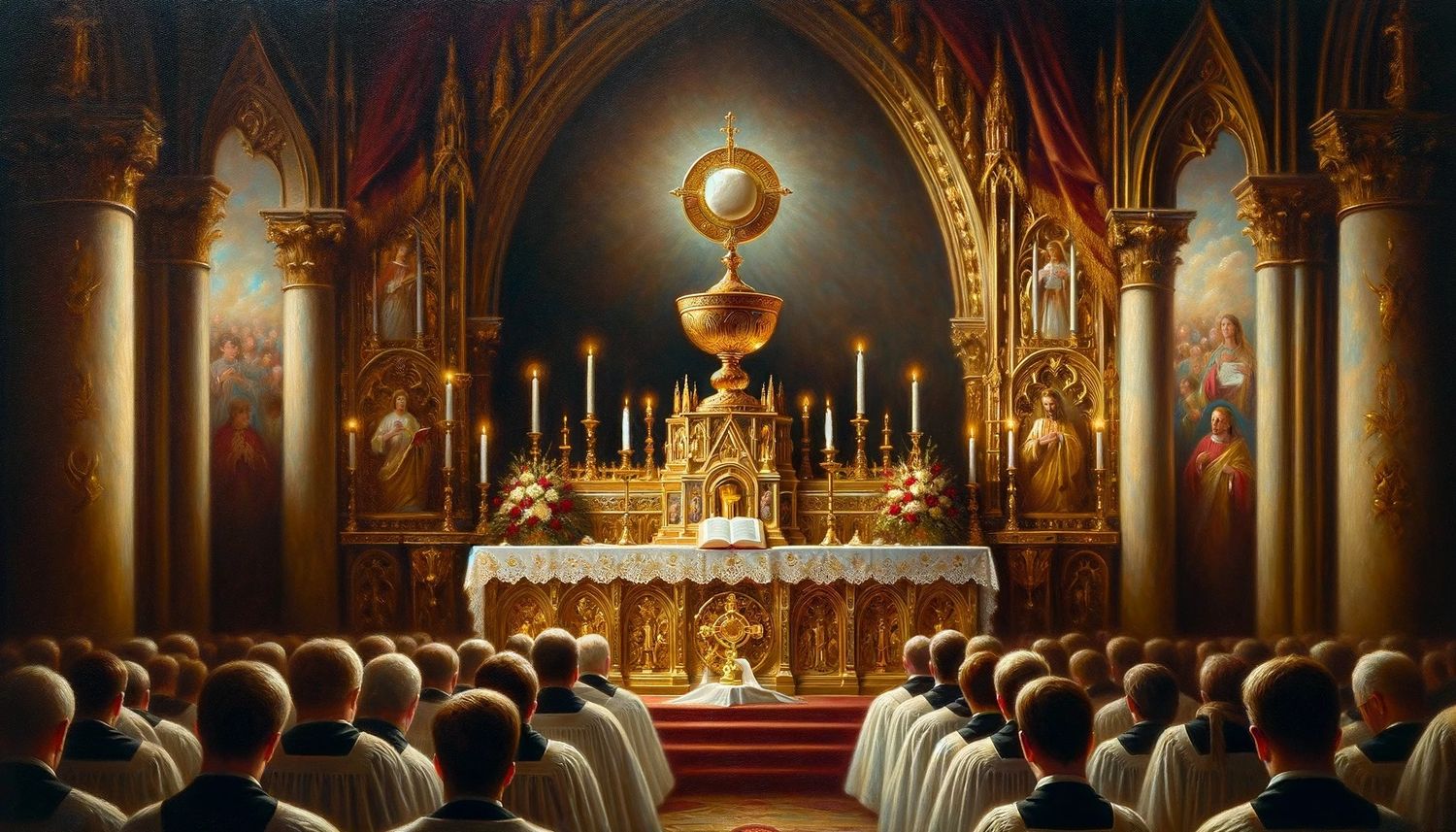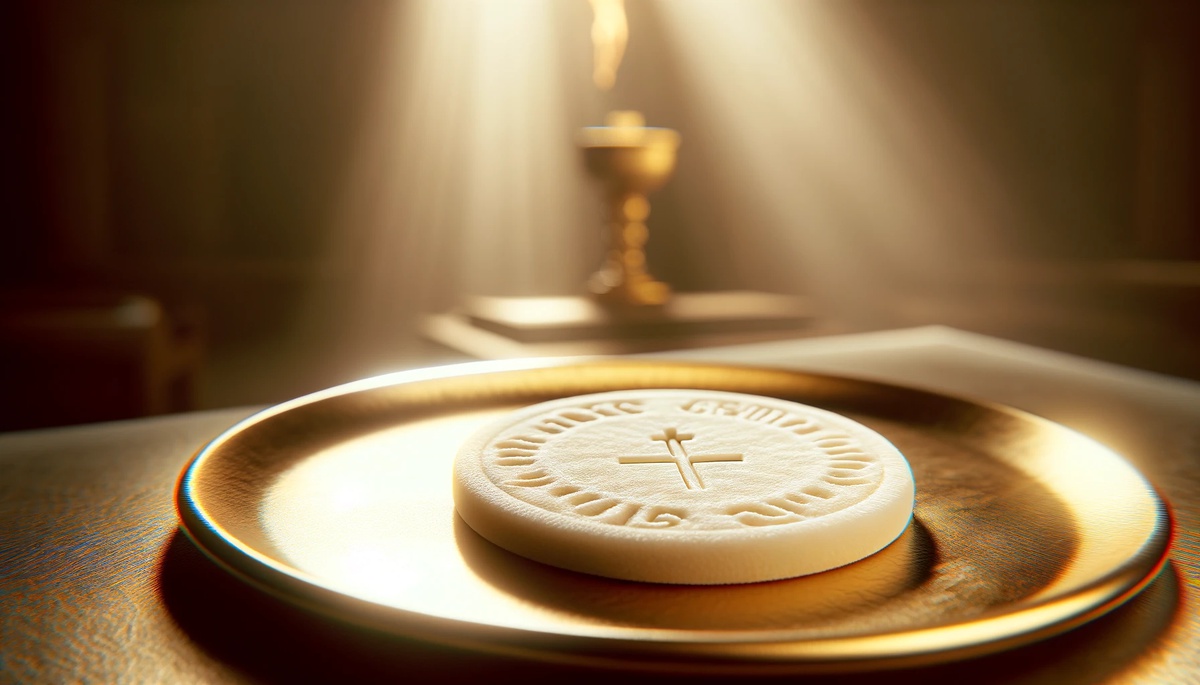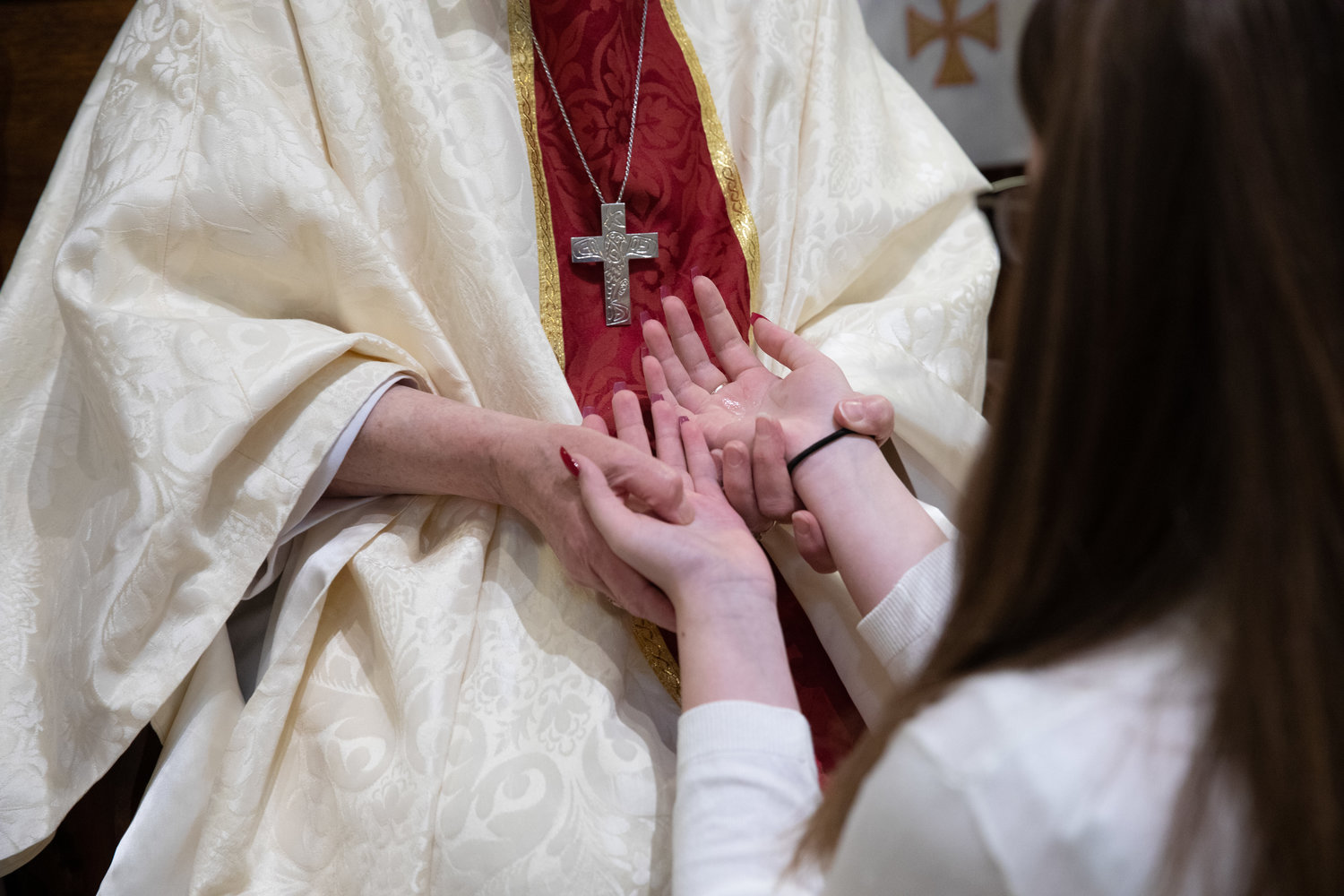Home>Theology and Spirituality>What Is The Sacrament Of Communion


Theology and Spirituality
What Is The Sacrament Of Communion
Published: February 24, 2024
Ericka Andersen, an editor at Christian.net, expertly merges digital strategy with content creation, focusing on faith and societal issues. Her communication skills enhance the platform's engaging narratives, fostering meaningful dialogue on belief's impact on society.
Learn about the significance and practice of the Sacrament of Communion in theology and spirituality. Explore its meaning and importance in Christian faith.
(Many of the links in this article redirect to a specific reviewed product. Your purchase of these products through affiliate links helps to generate commission for Christian.net, at no extra cost. Learn more)
Table of Contents
Introduction
The sacrament of communion, also known as the Eucharist or the Lord's Supper, holds profound significance in the Christian faith. It is a sacred ritual that symbolizes the central aspects of Christian theology and spirituality. Communion is a time-honored tradition that has been observed by Christians for centuries, serving as a poignant reminder of the sacrificial love and redemptive grace of Jesus Christ.
At its core, communion represents the spiritual nourishment and unity of believers within the body of Christ. It is a tangible expression of the intimate connection between God and humanity, as well as the interconnectedness of individuals within the Christian community. Through the act of partaking in communion, Christians commemorate the Last Supper, a pivotal event in the life of Jesus, where he shared bread and wine with his disciples, instructing them to do the same in remembrance of him.
The significance of communion extends beyond a mere symbolic gesture; it embodies the spiritual sustenance derived from the life, death, and resurrection of Jesus Christ. As Christians partake in the elements of bread and wine (or grape juice), they are reminded of the selfless sacrifice of Christ, who offered his body and blood for the redemption of humanity. This act of remembrance fosters a deep sense of gratitude, reverence, and spiritual renewal among believers, reinforcing their faith and commitment to living in accordance with the teachings of Jesus.
Furthermore, communion serves as a unifying force within the Christian community, transcending cultural, denominational, and geographical boundaries. It is a sacred practice that binds believers together in fellowship, underscoring their shared identity as followers of Christ. The act of partaking in communion fosters a sense of solidarity and mutual support, as individuals come together to partake in the sacred elements, reaffirming their faith and devotion to God and one another.
In essence, the sacrament of communion encapsulates the essence of Christian faith, embodying themes of sacrifice, redemption, unity, and spiritual nourishment. It stands as a timeless tradition that continues to resonate deeply with believers, serving as a poignant reminder of the enduring love and grace of Jesus Christ. Throughout the centuries, communion has remained a cornerstone of Christian worship, enriching the spiritual lives of countless individuals and fostering a profound sense of connection to the divine and to fellow believers.
The Meaning of Communion
The sacrament of communion holds profound significance within the Christian faith, embodying rich symbolism and spiritual depth. At its core, communion represents a sacred union between the divine and the human, encapsulating the essence of Christian theology and spirituality. It serves as a poignant reminder of the sacrificial love and redemptive grace of Jesus Christ, inviting believers to partake in a transformative act of remembrance and spiritual nourishment.
Communion, also known as the Eucharist or the Lord's Supper, traces its origins to the Last Supper, a pivotal event in the life of Jesus Christ. During this poignant gathering, Jesus shared bread and wine with his disciples, instructing them to partake in these elements in remembrance of him. This act of sharing a communal meal with his followers underscored the profound significance of unity, love, and self-sacrifice, laying the foundation for the sacrament of communion as a central tenet of Christian worship.
The act of partaking in communion involves the consumption of bread and wine (or grape juice), symbolizing the body and blood of Jesus Christ. This symbolic representation harkens back to the sacrificial nature of Christ's death on the cross, where his body was broken and his blood was shed for the redemption of humanity. As believers partake in the elements, they are invited to reflect on the profound implications of Christ's sacrifice, acknowledging the transformative power of his redemptive love and the spiritual sustenance it offers to those who partake in faith.
Furthermore, communion serves as a tangible expression of the intimate connection between God and humanity. It embodies the concept of spiritual nourishment, wherein believers partake in the symbolic elements to receive sustenance for their souls. This act of partaking in communion fosters a deep sense of gratitude and reverence, as individuals reflect on the selfless sacrifice of Christ and the enduring grace extended to all who seek spiritual nourishment and renewal.
Moreover, communion embodies the theme of unity within the Christian community. As believers come together to partake in the sacred elements, they reaffirm their shared identity as followers of Christ, transcending individual differences and embracing a sense of collective belonging. The act of communion fosters a profound sense of solidarity and mutual support, reinforcing the interconnectedness of believers within the body of Christ.
In essence, the meaning of communion transcends mere symbolism; it encapsulates the profound truths of Christian faith, serving as a transformative and unifying force within the Christian community. Through the act of partaking in communion, believers engage in a sacred ritual that embodies themes of sacrifice, redemption, unity, and spiritual nourishment, fostering a deep and enduring connection to the divine and to fellow believers.
The History of Communion
The history of communion can be traced back to the Last Supper, a momentous event in the life of Jesus Christ. It was during this intimate gathering with his disciples that Jesus instituted the sacrament of communion, imparting profound significance to the act of sharing bread and wine. The Last Supper, which took place on the eve of Jesus' crucifixion, serves as the foundational historical and spiritual context for the ritual of communion.
The accounts in the Gospels of Matthew, Mark, and Luke provide detailed narratives of the Last Supper, depicting Jesus sharing a communal meal with his disciples. During this poignant gathering, Jesus took bread, blessed it, and broke it, symbolizing his impending sacrifice and the offering of his body for the redemption of humanity. He then shared the bread with his disciples, instructing them to partake in remembrance of him. Similarly, Jesus took the cup of wine, gave thanks, and shared it with his disciples, signifying the shedding of his blood for the forgiveness of sins.
Following the crucifixion and resurrection of Jesus, the early Christian community continued the practice of communion as a central aspect of their worship and spiritual devotion. The Acts of the Apostles and the writings of the apostle Paul provide insights into the early Christian gatherings, where the observance of communion held profound significance. The apostle Paul, in his first letter to the Corinthians, emphasized the importance of partaking in communion with reverence and understanding, highlighting its transformative and unifying nature within the Christian community.
Throughout the centuries, the ritual of communion evolved within the diverse traditions of Christianity, adapting to various cultural and theological contexts. The early church fathers, such as Ignatius of Antioch and Justin Martyr, offered insights into the practice of communion in the early Christian communities, underscoring its centrality in the life of believers. Over time, theological reflections on the nature of Christ's presence in the elements of bread and wine, as well as the significance of communal participation, enriched the historical development of communion within Christian worship.
The history of communion reflects a rich tapestry of spiritual significance, theological reflection, and communal practice that has endured through the ages. It stands as a testament to the enduring legacy of the Last Supper and the profound impact of Jesus' words and actions on the formation and expression of Christian faith. The historical trajectory of communion serves as a poignant reminder of its enduring relevance and transformative power within the Christian tradition.
The Importance of Communion in Christianity
The sacrament of communion holds immense importance in Christianity, serving as a cornerstone of spiritual practice and theological significance. At the heart of its importance lies the profound symbolism and transformative impact it embodies within the Christian faith.
First and foremost, communion serves as a tangible expression of the redemptive love and sacrificial grace of Jesus Christ. Through the act of partaking in the elements of bread and wine, believers are invited to reflect on the selfless sacrifice of Christ, who offered his body and blood for the forgiveness of sins. This act of remembrance fosters a deep sense of gratitude and reverence, underscoring the foundational tenets of Christian faith centered on the life, death, and resurrection of Jesus.
Furthermore, communion embodies the concept of spiritual nourishment and renewal for believers. As individuals partake in the sacred elements, they are invited to receive sustenance for their souls, symbolizing the intimate connection between God and humanity. This act of spiritual nourishment fosters a deep sense of inner renewal and reconnection with the divine, reinforcing the transformative power of Christ's redemptive love in the lives of believers.
Moreover, communion serves as a unifying force within the Christian community, transcending individual differences and fostering a sense of collective belonging. As believers come together to partake in the sacred elements, they reaffirm their shared identity as followers of Christ, strengthening the bonds of fellowship and mutual support. This communal act of remembrance underscores the interconnectedness of believers within the body of Christ, fostering a profound sense of unity and solidarity.
Additionally, the importance of communion extends to its role in shaping the spiritual discipline and devotion of believers. Through the regular observance of communion, individuals are invited to engage in a reflective and reverent practice that deepens their faith and commitment to living in accordance with the teachings of Jesus. This act of spiritual discipline serves as a source of guidance and inspiration, nurturing a deeper understanding of the redemptive significance of Christ's sacrifice and its implications for daily Christian living.
In essence, the importance of communion in Christianity encompasses themes of sacrificial love, spiritual nourishment, communal unity, and spiritual discipline. It stands as a timeless tradition that continues to enrich the spiritual lives of believers, fostering a deep and enduring connection to the redemptive grace of Jesus Christ and to fellow members of the Christian community.
The Elements of Communion
The sacrament of communion is characterized by two primary elements: bread and wine (or grape juice). These elements hold profound symbolic significance within the Christian tradition, representing the body and blood of Jesus Christ. The use of these elements dates back to the Last Supper, where Jesus shared bread and wine with his disciples, imbuing these simple elements with profound spiritual meaning.
The bread used in communion symbolizes the body of Christ, broken for the redemption of humanity. It serves as a tangible representation of Christ's sacrificial love and the offering of his body on the cross for the forgiveness of sins. The act of breaking the bread and sharing it among believers underscores the communal aspect of the Christian faith, emphasizing the interconnectedness of individuals within the body of Christ.
Similarly, the wine (or grape juice) in communion symbolizes the blood of Jesus Christ, shed for the atonement of sins. It signifies the redemptive grace and forgiveness made possible through Christ's ultimate sacrifice. As believers partake in the cup, they are invited to reflect on the profound implications of Christ's blood shed for the remission of sins, fostering a deep sense of gratitude and reverence for the redemptive work of Jesus.
The elements of bread and wine in communion serve as powerful symbols of Christ's presence and sacrificial love within the Christian community. They embody the transformative power of Christ's redemptive grace, inviting believers to partake in a sacred act of remembrance and spiritual nourishment. Through the consumption of these elements, believers are reminded of the enduring significance of Christ's sacrifice and the spiritual sustenance it offers to all who partake in faith.
In essence, the elements of communion encapsulate the central tenets of Christian faith, serving as tangible reminders of Christ's sacrificial love, redemptive grace, and the unifying bond shared among believers. The act of partaking in these elements fosters a deep and enduring connection to the core principles of Christian spirituality, reinforcing the profound significance of Christ's sacrifice and its transformative impact on the lives of believers.
Read more: What Is The Form Of The Sacrament Of Baptism
The Role of Communion in the Church
The role of communion in the church is multifaceted and holds profound significance in shaping the spiritual life and communal identity of believers. At its core, communion serves as a sacred ritual that embodies the central tenets of Christian faith and fosters a deep sense of spiritual connection within the church community.
First and foremost, communion serves as a powerful symbol of unity and fellowship within the church. As believers gather to partake in the sacred elements of bread and wine, they reaffirm their shared identity as members of the body of Christ. This communal act of remembrance underscores the interconnectedness of individuals within the church, fostering a profound sense of solidarity and mutual support. Through the shared experience of communion, believers are reminded of their collective commitment to following the teachings of Jesus and supporting one another in their spiritual journey.
Furthermore, the role of communion extends to its function as a source of spiritual nourishment and renewal for the church community. As believers partake in the elements of bread and wine, they engage in a transformative act of remembrance, reflecting on the sacrificial love and redemptive grace of Jesus Christ. This act of spiritual nourishment fosters a deep sense of inner renewal and reconnection with the divine, reinforcing the transformative power of Christ's redemptive love in the lives of believers.
Moreover, communion plays a pivotal role in shaping the worship and spiritual discipline of the church. The regular observance of communion serves as a focal point of Christian worship, inviting believers to engage in a reflective and reverent practice that deepens their faith and commitment to living in accordance with the teachings of Jesus. This act of spiritual discipline nurtures a deeper understanding of the redemptive significance of Christ's sacrifice and its implications for daily Christian living, enriching the spiritual lives of the church community.
In essence, the role of communion in the church encompasses themes of unity, spiritual nourishment, and worship, serving as a transformative and unifying force within the church community. Through the act of partaking in communion, believers engage in a sacred ritual that reinforces their shared commitment to the teachings of Jesus and fosters a deep and enduring connection to the redemptive grace of Christ.
Communion in Different Christian Denominations
The sacrament of communion, while holding central significance in Christianity, is observed in diverse ways across various Christian denominations. Each denomination brings its unique theological perspectives, liturgical practices, and interpretations to the ritual of communion, reflecting the rich tapestry of Christian traditions.
In the Roman Catholic Church, communion, also known as the Eucharist, is regarded as a central sacrament and is celebrated with great reverence and solemnity. The doctrine of transubstantiation, which teaches that the bread and wine become the actual body and blood of Christ, underpins the Catholic understanding of communion. The Mass, a sacred liturgical service, is central to the celebration of communion in the Catholic tradition, emphasizing the sacrificial nature of Christ's presence in the Eucharistic elements.
In the Eastern Orthodox Church, communion, referred to as the Divine Liturgy, holds profound significance as the central act of worship. The Orthodox tradition emphasizes the mystical and transformative nature of communion, viewing the Eucharistic elements as vehicles of divine grace and spiritual nourishment. The celebration of the Divine Liturgy is characterized by intricate liturgical rites and ancient traditions, reflecting the rich historical and theological heritage of the Eastern Orthodox tradition.
Protestant denominations, including Lutheran, Anglican, Methodist, and Reformed traditions, exhibit diverse practices and theological interpretations of communion. In the Lutheran tradition, communion is viewed as a sacrament of the real presence of Christ, emphasizing the spiritual union of believers with Christ through the Eucharistic elements. Anglican and Episcopal churches maintain a balance between the Catholic and Protestant perspectives on communion, emphasizing the significance of the Eucharist as a symbol of unity and spiritual nourishment within the church community. The Methodist tradition underscores the concept of prevenient grace in communion, emphasizing the inclusive nature of Christ's redemptive love extended to all who partake in faith. Reformed traditions, such as Presbyterian and Congregationalist churches, emphasize the symbolic nature of communion, highlighting its significance as a memorial of Christ's sacrifice and a communal act of remembrance.
In the Baptist tradition, communion, often referred to as the Lord's Supper, is observed as a symbolic act of remembrance, underscoring the redemptive significance of Christ's sacrifice and the unity of believers within the church community. The act of partaking in communion serves as a poignant reminder of the foundational principles of Baptist faith, emphasizing individual faith and personal commitment to Christ.
The diverse practices and theological interpretations of communion across Christian denominations reflect the richness and complexity of the Christian tradition. While varying in their theological emphases and liturgical expressions, the celebration of communion serves as a unifying force, fostering a deep sense of spiritual connection and shared devotion to the redemptive grace of Jesus Christ across diverse Christian communities.
How Communion is Celebrated
The celebration of communion, also known as the Eucharist or the Lord's Supper, varies across different Christian traditions and denominations, each imbuing the ritual with unique theological perspectives and liturgical practices. Despite these variations, the essence of communion as a sacred act of remembrance and spiritual nourishment remains central to its observance.
In the Roman Catholic Church, the celebration of communion, referred to as the Mass, is characterized by solemnity and reverence. The Eucharistic liturgy, presided over by a priest, involves the consecration of bread and wine, which are believed to undergo transubstantiation, becoming the actual body and blood of Christ. The faithful partake in the Eucharistic elements as a means of receiving the real presence of Christ and participating in the sacrificial nature of the Eucharist.
In the Eastern Orthodox Church, the celebration of communion, known as the Divine Liturgy, is steeped in ancient traditions and intricate liturgical rites. The Eucharistic service is regarded as the pinnacle of worship, emphasizing the mystical and transformative nature of communion. The faithful approach the chalice to receive the consecrated bread and wine, viewing the Eucharistic elements as vehicles of divine grace and spiritual nourishment.
Protestant denominations, including Lutheran, Anglican, Methodist, and Reformed traditions, exhibit diverse practices in the celebration of communion. In the Lutheran tradition, communion is observed with a focus on the real presence of Christ in the Eucharistic elements, fostering a deep sense of spiritual union with Christ. Anglican and Episcopal churches emphasize the communal aspect of communion, highlighting its significance as a symbol of unity and spiritual nourishment within the church community. The Methodist tradition underscores the inclusive nature of Christ's redemptive love in communion, inviting all who seek spiritual nourishment to partake in the Eucharistic elements. Reformed traditions, such as Presbyterian and Congregationalist churches, view communion as a memorial of Christ's sacrifice and a communal act of remembrance, emphasizing its significance as a symbol of unity and spiritual renewal.
In the Baptist tradition, communion, often referred to as the Lord's Supper, is observed as a symbolic act of remembrance, underscoring the redemptive significance of Christ's sacrifice and the unity of believers within the church community. The act of partaking in communion serves as a poignant reminder of the foundational principles of Baptist faith, emphasizing individual faith and personal commitment to Christ.
Across these diverse traditions, the celebration of communion serves as a unifying force, fostering a deep sense of spiritual connection and shared devotion to the redemptive grace of Jesus Christ within the church community.














